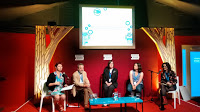What do Editors Look For In a Children's Book? - Part 2.
Following on from Part One of What Do Editors Look For In A Children's Book, featured last Thursday, Caroline Deacon tells us more about the event organised by SCBWI Southeast Scotland at the Edinburgh Internal Book Festival.
Sally: It’s often about other factors. Maybe it doesn’t quite fit on our list
Lauren: I can always work on a plot, but for me, it must have an original voice, be memorable. I want it to stay with me
Barry: For me, it’s can I work with this author?
There followed a lively Q&A session with the audience.
Susan wanted to know about using dialect in today’s more global market, contrasting today's needs with the way dialect was conveyed in something like Machine Gunners by Robert Westall, published in 1975. Barry revealed he’d been working on Machine Gunners at the time, and had to tell Westall to remove all the ‘bloody’s’, which is an interesting example of how things have changed. Barry felt you could still use dialect - ‘an addition to the mix’, though it should be integrated into other forms of dialogue. The other panelists agreed, Sally saying it was all about whether the child would understand. On that point Lauren added, ‘read your dialogue aloud. It’s amazing how often it can look OK on the page, but when you read it aloud, it’s clunky. That makes it inauthentic.’
The panel felt these two were completely different kettles of fish, though Lauren pointed out that a middle grade book is composed of episodes - which are chapters - but each must work on its own, and cited the Naughty Little Sister books as good examples. Barry said with M/G he often asks writers to add a page of back story which really brings characters alive, which would not work for picture book. Not all of it ends up on the
page, it’s more like research, but it is essential.
Lauren: Not narrative I’ve seen before. No familiar voices. I want NEW plot. NEW voice.
Sally: Not too wacky. Attack of the Giant Robot chickens is funny and original and works.
Barry said he didn’t want multi-volume fantasy where the synopsis is longer than the book, but then Lauren said that’s just up her street.
The panel all had much the same to say about this - don’t base it on what is happening now. That will soon be out of date. Think of what’s working thematically in popular books. For instance, after Twilight we were flooded with vampire stories, which is aping the content, but the themes in Twilight could inspire you to write a good love story or a gang story.
Generally the panel would be happy with links to the illustrator’s website. They also tend to work with agencies, so get yourself an agent if you can.
Lauren: Realistically few books make it to the big screen so you shouldn't worry about how it would work as a film.
Barry: We do a lot of book to screen and it’s the screenwriters problem, not the authors. We wouldn’t reject a book for that reason
Sally: It’s important it works as a book. The problem of filming it doesn’t enter my thought process.
There was general agreement that if it has come from Golden Egg, they would definitely sit up and take notice. So it would depend on the editorial service. Barry added, ‘Also any academic writing courses that you’ve done are interesting, though they tend to get your work to good literary standards rather than to publishing standards. But mention it’
Lauren: 98% through agent
Barry: A lot of what we publish comes through agents, but we also have the Big Idea Competition, Chicken House Open Coop, plus Undiscovered Voices. But otherwise it would be 50/50
Sally: 50/50. We do accept unsolicited manuscripts but the best way in is through the Kelpies prize.
Even after such a comprehensive discussion the editors stuck around when we retired to the signing tent and the conversation flowed for another hour. We’re a talkative bunch where books are concerned!
Thanks once again for the insights and enthusiasm of the panel and the keen interest from the audience.
If you’re thinking of approaching any editors or agents, and the thought of preparing the necessary pitch fills you with horror, why don’t you book yourself in for our next event on 24th Sept in Edinburgh: Pitch your book without panicking. We’ve got a UK and a US agent giving valuable insights into how to make your written and spoken pitches stand out. Book here

Caroline Deacon is a published journalist and non-fiction author who is now seeking representation for her YA thrillers.
Why do the panel reject books that are ‘nearly there’?
Sally: It’s often about other factors. Maybe it doesn’t quite fit on our list
Lauren: I can always work on a plot, but for me, it must have an original voice, be memorable. I want it to stay with me
Barry: For me, it’s can I work with this author?
There followed a lively Q&A session with the audience.
Dialect
Susan wanted to know about using dialect in today’s more global market, contrasting today's needs with the way dialect was conveyed in something like Machine Gunners by Robert Westall, published in 1975. Barry revealed he’d been working on Machine Gunners at the time, and had to tell Westall to remove all the ‘bloody’s’, which is an interesting example of how things have changed. Barry felt you could still use dialect - ‘an addition to the mix’, though it should be integrated into other forms of dialogue. The other panelists agreed, Sally saying it was all about whether the child would understand. On that point Lauren added, ‘read your dialogue aloud. It’s amazing how often it can look OK on the page, but when you read it aloud, it’s clunky. That makes it inauthentic.’
 Lauren Fortune giving valuable insights to SCBWI members and guests in the signing tent |
Sarah asked about moving from picture book to middle grade. |
What do you NOT want?
Lauren: Not narrative I’ve seen before. No familiar voices. I want NEW plot. NEW voice.
Sally: Not too wacky. Attack of the Giant Robot chickens is funny and original and works.
Barry said he didn’t want multi-volume fantasy where the synopsis is longer than the book, but then Lauren said that’s just up her street.
Have any themes had their day?
The panel all had much the same to say about this - don’t base it on what is happening now. That will soon be out of date. Think of what’s working thematically in popular books. For instance, after Twilight we were flooded with vampire stories, which is aping the content, but the themes in Twilight could inspire you to write a good love story or a gang story.
How do you prefer illustrators to advertise?
Generally the panel would be happy with links to the illustrator’s website. They also tend to work with agencies, so get yourself an agent if you can.
When writing, if there is something that you know would be really difficult to film, should you avoid it?
Lauren: Realistically few books make it to the big screen so you shouldn't worry about how it would work as a film.
Barry: We do a lot of book to screen and it’s the screenwriters problem, not the authors. We wouldn’t reject a book for that reason
Sally: It’s important it works as a book. The problem of filming it doesn’t enter my thought process.
 |
| Sally Polson inspiring SCBWI members and guests after the event. |
Would you advise authors to use a freelance editorial service?
There was general agreement that if it has come from Golden Egg, they would definitely sit up and take notice. So it would depend on the editorial service. Barry added, ‘Also any academic writing courses that you’ve done are interesting, though they tend to get your work to good literary standards rather than to publishing standards. But mention it’
How much of the things you publish come through an agent, and how much directly from the writer?
Lauren: 98% through agent
Barry: A lot of what we publish comes through agents, but we also have the Big Idea Competition, Chicken House Open Coop, plus Undiscovered Voices. But otherwise it would be 50/50
Sally: 50/50. We do accept unsolicited manuscripts but the best way in is through the Kelpies prize.
Even after such a comprehensive discussion the editors stuck around when we retired to the signing tent and the conversation flowed for another hour. We’re a talkative bunch where books are concerned!
Thanks once again for the insights and enthusiasm of the panel and the keen interest from the audience.
If you’re thinking of approaching any editors or agents, and the thought of preparing the necessary pitch fills you with horror, why don’t you book yourself in for our next event on 24th Sept in Edinburgh: Pitch your book without panicking. We’ve got a UK and a US agent giving valuable insights into how to make your written and spoken pitches stand out. Book here

Caroline Deacon is a published journalist and non-fiction author who is now seeking representation for her YA thrillers.











No comments:
We love comments and really appreciate the time it takes to leave one.
Interesting and pithy reactions to a post are brilliant but we also LOVE it when people just say they've read and enjoyed.
We've made it easy to comment by losing the 'are you human?' test, which means we get a lot of spam. Fortunately, Blogger recognises these, so most, if not all, anonymous comments are deleted without reading.